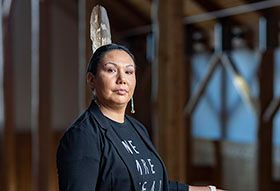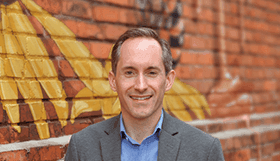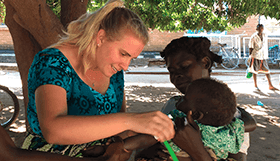UW Majors: History, Zoology, and Comparative Biomedical Science
Age: 35 | Madison
Research Scientist, UW–Madison School of Veterinary Medicine
He’s an expert on tropical mosquito-borne diseases, but Matthew Aliota also runs grand experiments in communication.
"I was fascinated... and simultaneously heartbroken by the global impact of these diseases."
In 2015, the pathobiologist was one of the first scientists to discover the presence of the Zika virus in Colombia. By the next year, an epidemic of the virus — believed to cause damage to the developing human brain — had spread to at least 50 countries.
“Zika virus caught the world off guard, but it should not have,” Aliota says.
His expertise dates back to his work as a UW undergraduate researcher, when he began studying how mosquitoes and microscopic parasites can affect people in underdeveloped countries. He went on to research mosquito- and tick-borne diseases for several years as a fellow in a New York state public-health lab. “I was fascinated by the complexity of the biology I was learning and simultaneously heartbroken by the global impact of these diseases,” he says.
Matthew Aliota is on the front lines of fighting the Zika virus, and he’s also an expert at communicating his findings with the public. Aliota’s recent Zika research includes developing a mouse model to study how the virus affects the brain, as well as confirming that a particular type of benign bacterium can prevent transmission of the virus in mosquitoes.
Aliota wants to share discoveries like these not just quickly, but far and wide. It’s when research findings are made public and more people can share in knowledge, he says, that science can more quickly lead to virus-blocking strategies and improved public health. To that end, Aliota makes it a point to collaborate with many bright minds. He is part of a research team that includes fellow faculty, undergraduate researchers, graduate students, and scientists who visit from regions affected by mosquito-carried disease. And, he’s a generous research ambassador, investing his time in outreach to students in K–12 classrooms, elected officials, news media, and fellow alumni. “I believe scientific communication is an important responsibility,” he says.
Q&A with Matthew
What’s the best piece of advice you’ve ever received?
Be yourself.
What are you reading now?
The Shipping News by Annie Proulx. I also obsessively read the news and of course stay current with the scientific literature in my field.
What five items would you take to a desert island?
Knife, fire starter, cordage, shelter, contact lenses (can’t see and survive without them).
What is the one thing every UW student must do?
Spend as much time as possible at the Terrace. Take a class outside of your comfort zone — you never know where it might lead. I know that is two suggestions, but there are too many things to take advantage of at the UW to list just one.
What advice would you offer to graduating seniors?
Relax, breath, and enjoy every last minute on campus. You are well equipped to face the challenges ahead.
What is your guilty pleasure?
Oreos.
What occupies your free time?
My daughter.
What was your first job?
Cashier/custard scooper at Kopp's Custard.
If you could trade places with any person for a week, living or dead, real or fictional, who would it be?
Jon Stewart — but it might be that I just really would like to meet him.
What is your favorite quote?
“The truth is radical.” — UW history professor Harvey Goldberg
Who is your hero? (or who or what inspires you?)
I find inspiration in lots of places. Sometimes it comes from a walk in the mountains or a quiet run out to Picnic Point at lunch. This definitely helps recharge the batteries when I am stuck in a rut. I don’t have heroes per se, but I do admire lots of different people. Really, anyone who has courage and conviction or is deeply passionate about making a positive difference in other people’s lives motivates me to be a better human. Inspiration is everywhere — you just have to look.





